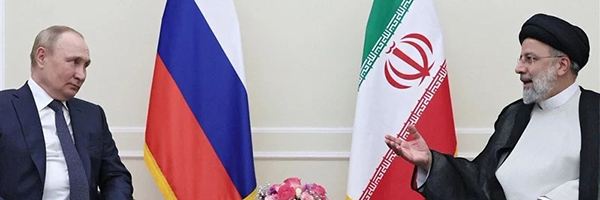EU Prepares New Sanctions Against Russia and Iran While Both Countries Advance Military Cooperation

These sanctions also include a trade ban and a technology export control package which restricts several electronic components employed in Russian armed systems, such as helicopters, drones, and missiles. They are said to be, as a whole, the heaviest one ever imposed by Europe against Moscow.
Furthermore, according to von der Leyden, this is the first time the European bloc proposes to sanction Iranian bodies and entities such as the ones linked to the Iranian Revolutionary Guards. In addition to that, European authorities in Brussels are discussing a fifth wave of sanctions against Iran pertaining to the issue of human rights, and they will include assets-freezing and visa-banning blacklists. Israeli diplomats have been pressuring for further sanctioning of Iran.
The stated goal of these measures is to make it more difficult for Russia to finance its military efforts and to build new arms.
The many sanctions so far enforced have failed to deter Moscow, which has in fact intensified its campaign – even Secretary-General Jens Stoltenberg has admitted that Kiev is losing. According to Henry Foy, Financial Times European correspondent, a year of conflict has left the armories of Europe dry.
As for Iran, its currency did fall to its lowest against the US dollar on January 21, and the country is struggling with internal problems and high inflation.
Regarding Russia, however, it is widely understood today that the sanctions thus far have backfired, and actually played a significant part in both the British and the European current energy crises. This situation has served US interests quite well, while American arms manufacturers have been profiting from perpetuating the current conflict. Europe today is facing deindustrialization (driven by high energy costs) while its own American ally threatens the continent with a subsidy war, which is wonderful to American companies, but could be fatal for European industry.
Moreover, the sanctions and their impact have also brought about a number of unintended consequences: for example, the global rise in commodity prices has been largely perceived as a result of Western sanction policies, and this has forced the global south to look for parallel mechanisms and alternatives. Furthermore, international trade has been reconfigured in such a manner that may actually pave the way for new political and diplomatic opportunities, as I have written before: in the post-sanctions world, Moscow has managed to redirect much of its trade to neighboring nations, and that can in fact boost Eurasian integration; in today’s world, insulating local industries from geopolitical disputes is increasingly difficult.
Right now, the geopolitical shifts caused by the new cold war and the crisis in Ukraine has brought Russia and Iran much closer. Both countries are strengthening their military ties and Tehran plans to purchase Russia’s Sukhoi Su-35 advanced fighter jet, as announced by Brigadier General Hamid Vahedi, Islamic Republic of Iran Air Force’s commander. This is a significant development in itself: so far, China remains the only nation to have bought those from Russia. Such a purchase would have the potential to change the current regional balance of air power in the Persian Gulf.
These developments are part of an even larger process: in September 2021 I wrote on how Iran’s admission into the Shanghai Cooperation Organization’s (SCO) as a permanent member was the realization of a greater Eurasian concept. Iran, as well as other SCO members, has an immediate and long-term concern over Afghanistan and Central Asian stability, for instance. Moreover, the North-South Transit Corridor, once again under the spotlight, can become a new promising route and even an alternative to the Suez Canal. In defiance of sanctions, the Persian nation, with Russian help, can once again become a regional transit hub, as it always was historically
Interestingly, the US State Department has signaled that the Iran nuclear deal, the Joint Comprehensive Plan of Action (JCPOA), is not necessarily dead – for instance, on February 10, Washington officially notified the US Congress that it would renew a six-month suspension of American sanctions targeting Chinese, Russian other foreign support to the Islamic Republic’s nuclear program. Such was one of the main requirements of the JCPOA.
The truth is that the global landscape has now changed, both economically and politically, and Russia needs to develop new supply chains. Iran plays a large part in this and both countries have an interest in working together to counter Western endeavors to isolate them economically. Although the new European sanctions may bring some damage, especially to Iran, they could also backfire as the previous ones have and may end up boosting Eurasian integration.
*
Uriel Araujo is a researcher with a focus on international and ethnic conflicts.
